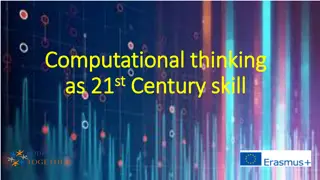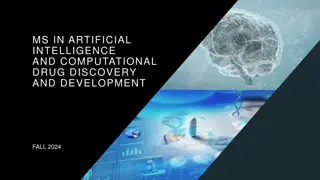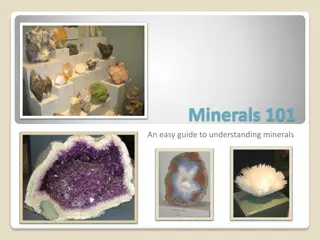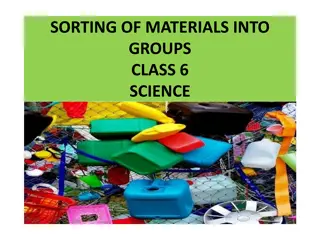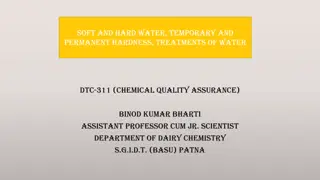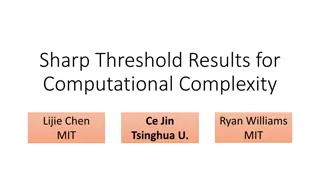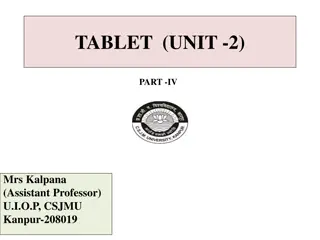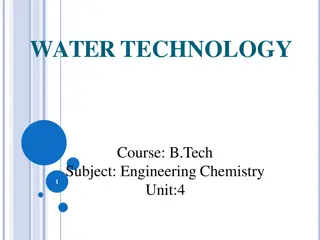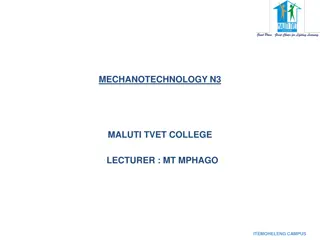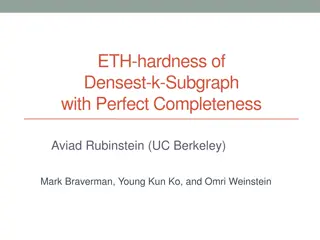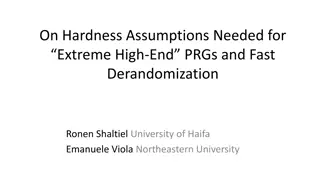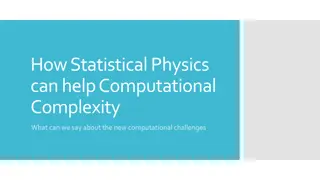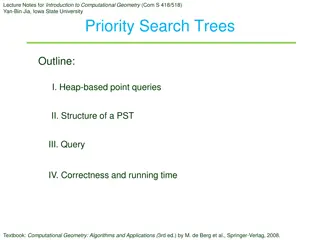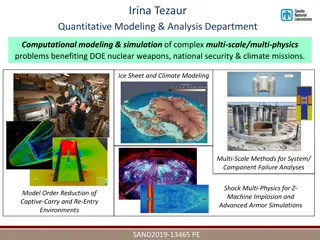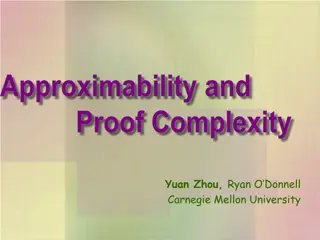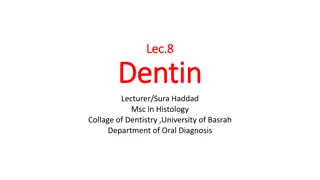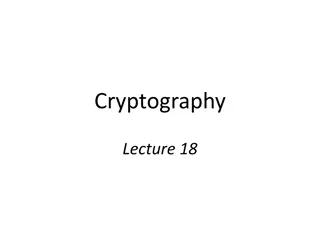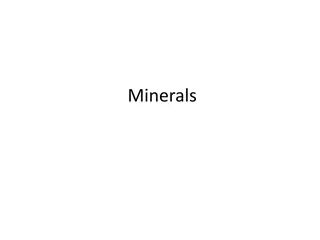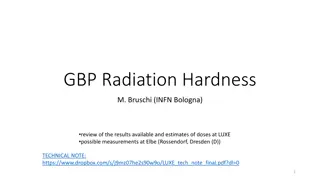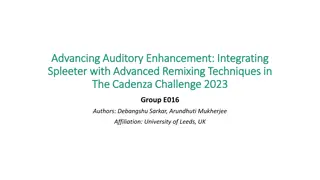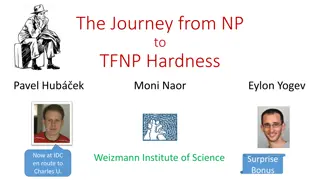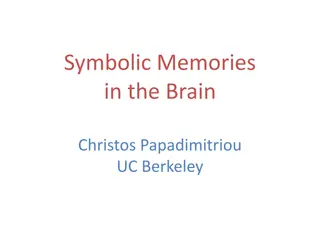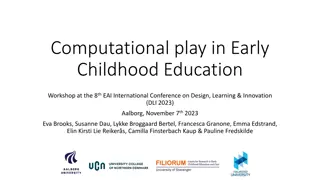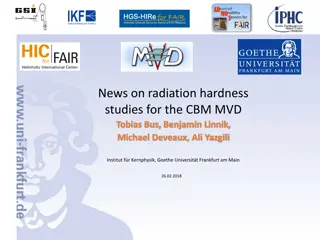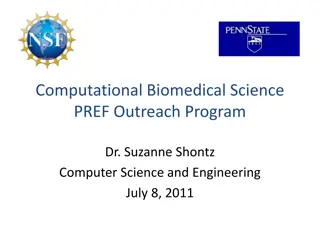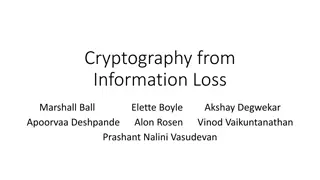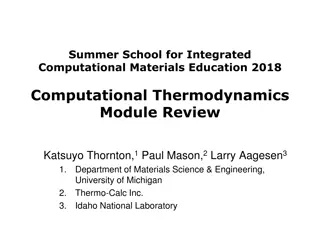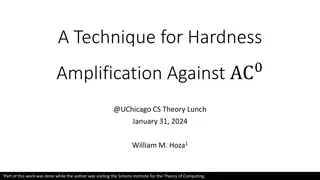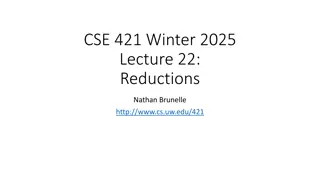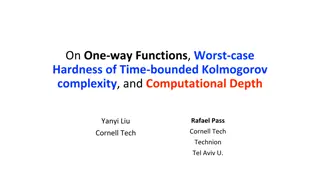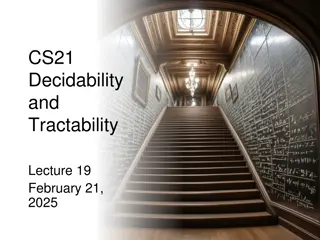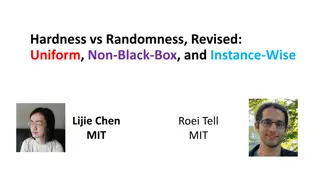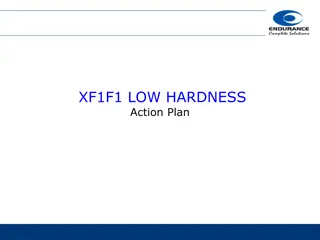Computational thinking as 21st Century skill
Computational thinking is a critical skill for the digital age, involving problem-solving techniques that enable computers to process information effectively. It precedes programming and requires breaking down complex problems into manageable steps. Educators emphasize computational thinking exercis
7 views • 4 slides
Master's Program in Computational Drug Discovery and Development - Fall 2024 Curriculum
This Master's program offers a comprehensive curriculum focusing on Artificial Intelligence, Computational Drug Discovery, and Development. With a blend of cutting-edge technologies and practical applications, students delve into techniques, AI/ML, big data mining, modeling, and more. Through intens
1 views • 7 slides
Minerals: A Comprehensive Guide
Earth's crust is composed of rocks made up of different minerals, which are naturally occurring, inorganic solids with distinct atomic structures and chemical compositions. Minerals exhibit properties like solidity, natural occurrence, inorganic nature, fixed composition, and crystal form. Identifyi
4 views • 20 slides
Material Classification and Properties in Science
Explore the importance of grouping materials based on their properties, such as appearance, hardness, solubility, density, and transparency. Discover how materials are classified and grouped, benefitting us in organization, efficiency, and study. Learn about the significance of material characterist
1 views • 15 slides
Water Hardness and Treatment Methods
Water plays a crucial role in the food industry, particularly in the dairy sector. This article explores the types of water, focusing on hard and soft water, and discusses temporary and permanent hardness. It also delves into various treatments for water hardness, such as the cold lime method, base
3 views • 27 slides
Insights on Computational Complexity Threshold Results
Exploring the challenges in proving major lower bounds for computational complexity, focusing on the Hardness Magnification and Minimum Circuit Size Problem (MCSP). Discusses the difficulties in proving weak and strong LBs, highlighting recent theorems and barriers that impact progress in the field.
0 views • 21 slides
Quality Control Tests for Tablet Production
Quality control tests play a crucial role in ensuring the safety and efficacy of tablet products. This article discusses various parameters like general appearance, size, shape, unique identification markings, organoleptic properties, hardness, friability, weight variation, and content uniformity th
2 views • 11 slides
Water Hardness and Impurities in Water Technology
Water technology in the field of Engineering Chemistry explores sources of water, major impurities, hardness of water, and distinctions between hard and soft water. The content delves into the impact of mineral concentrations on soap lathering, categorizes hardness into temporary and permanent forms
2 views • 72 slides
Metals: Properties and Heat Treatment Processes
Metals can be categorized into ferrous and non-ferrous based on the presence of iron. Ferrous metals contain iron, while non-ferrous metals do not. Each type has distinct properties like toughness, tensile strength, elasticity, plasticity, ductility, malleability, and hardness. Heat treatment proces
1 views • 9 slides
Recent Applications of Quasi-Poly Time Hardness in Densest k-Subgraph
Recent applications of the Birthday Repetition technique have demonstrated the quasi-polynomial time hardness in various computational problems, including AM with k provers, Dense CSPs, Free games, and Nash equilibria. These applications also explore the potential implications in signaling theory an
0 views • 18 slides
Insights on Hardness Assumptions for Extreme PRGs
BPP=P requires certain complexity theoretical hardness assumptions. Recent advancements aim for extreme high-end PRGs based on stronger assumptions, presenting challenges in black-box proofing and loss factors. The cost of hybrid arguments for PRGs is analyzed, highlighting the need for qualitativel
2 views • 14 slides
Computational Complexity Through Statistical Physics
In the age of vast data growth, tackling complex computational problems is crucial. Statistical physics can provide insights into handling the new challenges arising from the exponential increase in data. As we delve into understanding the complexity of computational tasks, it becomes evident that e
1 views • 24 slides
Introduction to Priority Search Trees in Computational Geometry
This lecture outlines the structure and query process of Priority Search Trees (PST) in computational geometry. It covers heap-based point queries, range trees for windowing queries, handling query ranges in 1D and 2D spaces, and using heaps to efficiently handle query ranges. The content discusses
1 views • 18 slides
Advancing Computational Modeling for National Security and Climate Missions
Irina Tezaur leads the Quantitative Modeling & Analysis Department, focusing on computational modeling and simulation of complex multi-scale, multi-physics problems. Her work benefits DOE nuclear weapons, national security, and climate missions. By employing innovative techniques like model order re
2 views • 6 slides
Approximability and Proof Complexity in Constraint Satisfaction Problems
Explore the realm of constraint satisfaction problems, from Max-Cut to Unique Games, delving into approximation algorithms and NP-hardness. Dive into open questions surrounding the Unique Games Conjecture, the hardness of Max-Cut approximations, and the quest to approximate the Balanced Separator pr
0 views • 25 slides
Dentin: Structure, Properties, and Functions
Dentin is a vital component of teeth, featuring various structural units such as dentinal tubules. This calcified tissue determines tooth shape, hardness, and radiolucency. It plays a significant role in supporting enamel, cementum, and pulp, with dentinal tubules housing odontoblast processes. Dent
1 views • 29 slides
Introduction to Computational Number Theory in Cryptography
Practical private-key cryptography can be done without advanced math, but understanding computational number theory is essential for public-key encryption. This field focuses on the computational difficulty of problems, analyzing algorithms' running times, classifying problems as easy or hard based
1 views • 27 slides
Minerals: Properties and Identification
Minerals are naturally occurring solid inorganic substances with definite compositions and structures. They are classified based on physical and chemical properties. This content discusses the definition of minerals, the conditions that classify gold as a mineral, distinguishing mineral characterist
0 views • 29 slides
Advancements in Sapphire Detectors for Radiation Hardness Testing and High-Energy Physics Experiments
Reviewing radiation hardness testing, dose estimates, and measurements at LUXE, this content delves into the use of sapphire detectors in high-energy physics experiments. Highlighting sapphire's material properties, such as high radiation resistance, low cost, and specific characteristics, the text
1 views • 13 slides
Advancing Auditory Enhancement: Integrating Spleeter with Advanced Remixing Techniques in The Cadenza Challenge 2023
Our project for The Cadenza Challenge 2023 focused on improving audio for headphone users with hearing loss by integrating Spleeter's deep learning capabilities. We utilized N-ALR prescriptions, Butterworth bandpass filters, and Dynamic Range Compression to enhance audio quality. By leveraging advan
0 views • 19 slides
Insights into TFNP Hardness and Complexity from Various Perspectives
Delve into the realm of TFNP hardness and complexity through discussions on the journey from NP to TFNP, TFNP total function NP, barriers for proving TFNP hardness, Impagliazzo's Five Worlds, and more. Explore the nuances of NP, coNP, P, and NP completeness while pondering the weakest assumptions un
0 views • 36 slides
Computational Theories of Brain Function
In this series of images and text snippets, the discussion revolves around the emerging field of computational theories of brain function. Various aspects such as symbolic memories, the relationship between the brain and computation, the emergence of the mind from the brain, and computational thinki
1 views • 53 slides
Welding Heat Flow and Cooling Rate Calculations
Understanding welding heat flow and cooling rate calculations is essential for determining the critical cooling rate in welding processes. Factors such as plate thickness, number of passes, and relative plate thickness play a crucial role in selecting the appropriate equations for calculating coolin
0 views • 10 slides
Computational Play in Early Childhood Education: DLI 2023 Workshop
The workshop at the 8th EAI International Conference on Design, Learning & Innovation (DLI 2023) in Aalborg aims to delve into the application of computational play with mathematics in early childhood education. Through live sessions and discussions, opportunities and challenges in utilizing computa
0 views • 7 slides
Monolithic Sensors for Radiation Hardness Studies in CBM MVD
High-tech advanced monolithic sensors are pivotal in conducting radiation hardness studies for the CBM MVD project. Leakage currents, radiation tolerance, and measurement techniques are explored, providing insights into current challenges and potential solutions in sensor technology development.
0 views • 8 slides
Computational Biomedical Science Outreach Program - Overview
Delve into the intersection of computational science and biomedical engineering through the Computational Biomedical Science Outreach Program led by Dr. Suzanne Shontz. Explore the application of computational tools in treating conditions like deep vein thrombosis and hydrocephalus. Learn about the
0 views • 29 slides
Determination of Water Hardness using Chelatometry
Determination of total water hardness involving the presence of various metal salts such as Ca2+, Mg2+, Sr2+, and Ba2+. The process includes titration using Chelaton 3 and indicators like Eriochromium black T and Murexid to calculate the concentration of calcium and magnesium. The procedure involves
1 views • 9 slides
Cryptography and Hard Problems: Exploring Structure and Complexity
This content delves into the intricate world of cryptography, focusing on the challenges posed by hard problems with sufficient structure. It discusses various aspects such as hardness, structure, statistical zero-knowledge proofs, one-way functions, worst-case and average-case hardness, lossy reduc
0 views • 27 slides
Hardness Assessment of Cryptographic Assumptions
Delve into the assessment of the hardness levels of cryptographic assumptions such as factoring-based and dlog-based problems. Understand the security recalls, algorithms for factoring, and dlog algorithms for generic and specific groups. Gain insights into the optimal algorithms and the efficiency
1 views • 5 slides
Understanding Hardness Magnification in Lower Bound Frontiers
Explore the concept of Hardness Magnification (HM) in computational complexity theory, where weak lower bounds lead to strong lower bounds. Discover recent results and examples showcasing the implications of HM in advancing lower bound research.
0 views • 24 slides
Lower Bound for Proving Hardness of Learning with Rounding
Explore the complexities of learning with rounding in cryptographic systems, including LWE and LWR problems, fundamental hardness assumptions, and constructions of deterministic cryptosystems. Can we directly construct pseudo-random functions from LWR? Delve into the challenges and implications in m
0 views • 92 slides
Computational Thermodynamics Module Review - Summer School 2018
Explore the Computational Thermodynamics Module at the Summer School for Integrated Computational Materials Education in 2018. Dive deep into thermodynamic concepts, phase equilibrium, and the application of computational tools in real-world engineering problems. Gain insights into Gibbs Free Energy
0 views • 14 slides
Technique for Hardness Amplification Against AC0 Circuits
Explore the concept of hardness amplification in the realm of theoretical computer science, focusing on converting hard functions to even harder ones. Topics cover Yao's XOR Lemma, quantifying hardness, reasons for amplifying hardness, and limitations of Yao's Lemma against AC0 circuits. Learn about
0 views • 24 slides
Understanding the Hardness of Problems and Polynomial Time Reductions
Discover the concept of problem hardness, polynomial time algorithms, and reductions in this informative lecture. Learn about problem definitions, instances, and relative hardness. Explore the idea of polynomial time reduction and its implications in computational complexity theory.
0 views • 47 slides
Computational Complexity Theory Lecture 9: PSPACE-Completeness Recap
Explore the concepts of PSPACE-hardness, PSPACE-completeness, and log-space reductions in computational complexity theory through a detailed lecture recap. Understand the significance of quantified Boolean formulas and true quantified Boolean formulas in the context of PSPACE-complete problems.
0 views • 68 slides
Understanding One-way Functions and Worst-case Hardness in Complexity Theory
Delve into the world of one-way functions (OWF) and explore their significance in computational complexity theory. Discover how OWFs are intertwined with worst-case hardness and time-bounded Kolmogorov complexity, shedding light on the challenges and implications they present in modern cryptography.
0 views • 15 slides
Understanding Complexity Classes and Computational Hardness
Explore the concepts of decidability, tractability, hardness, and completeness in computational theory. Discover how problems can be transformed, languages can be defined, and complexity classes can be analyzed to determine the difficulty of computational tasks. Dive into the realm of EXP-complete p
0 views • 40 slides
Derandomization: New Framework and Assumptions for Hardness-to-Randomness
Explore the latest concepts in derandomization with a focus on new uniform hardness assumptions, non-black-box techniques, and instance-wise reconstructive approaches. Discover how randomness can be transformed into a valuable resource through innovative methodologies and open problems in the field.
0 views • 45 slides
Technique for Hardness Amplification Against AC0 Circuits
Explore the study on hardness amplification against AC0 circuits, analyzing depth hierarchies, average-case complexity, and correlation bounds in parallel computation models. Discover insights from Sipser, Yao, and Håstad, as well as the correlation bound for depth reduction proposed in William M.
0 views • 23 slides
Understanding Low Hardness Issue in XF1F1: Action Plan & Root Cause Analysis
Explore the conditions, causes, and solutions related to the low hardness issue in XF1F1 parts. Discover the process flow, actual conditions, and verification facts aiming to address hardness discrepancies and improve quality control.
0 views • 8 slides
